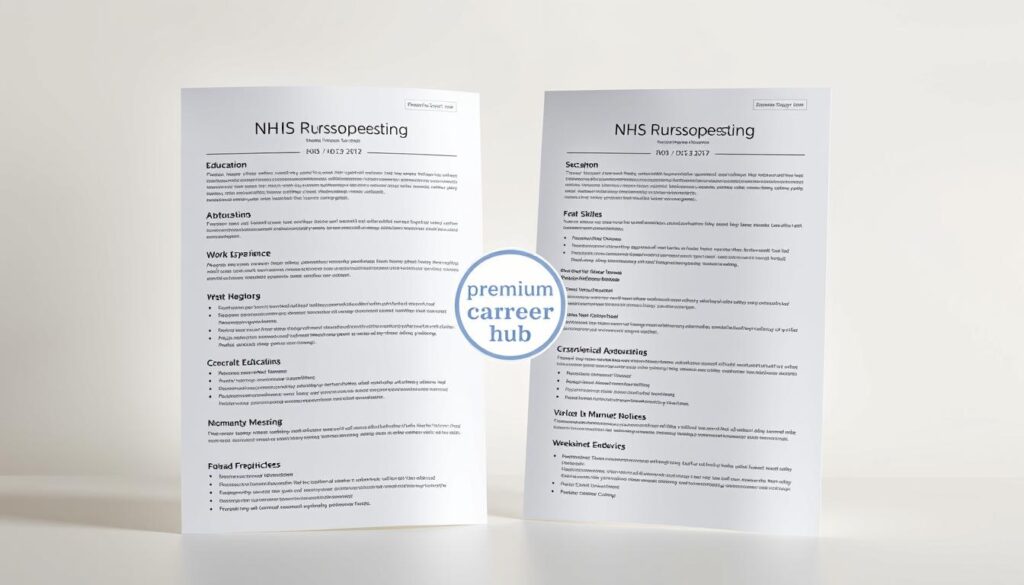NHS Nurse Jobs 2025: Band 5-7 Opportunities & Application Tips

As you explore the ever-evolving landscape of nursing careers within the NHS, you’ll discover a myriad of opportunities across various bands. If you’re looking to advance your nursing career or simply starting out, understanding the available Band5-7 opportunities is crucial.
The NHS continues to be a significant employer of nursing professionals, offering a range of roles that cater to different skills and experiences. To successfully navigate these opportunities, it’s essential to be well-prepared for the application process. This includes tailoring your application to highlight relevant experience and qualifications, as well as being aware of the application tips that can make your application stand out.
Key Takeaways
- Explore various Band5-7 nursing opportunities available within the NHS.
- Understand the application process to increase your chances of success.
- Tailor your application to highlight relevant nursing experience.
- Stay informed about the evolving NHS nursing landscape.
- Utilise effective application tips to make your application stand out.
The Current NHS Nursing Landscape in 2025
As we step into 2025, the NHS nursing landscape is undergoing significant transformations. The healthcare sector is continually evolving, and the NHS is at the forefront of this change. You are about to explore the current state of NHS nursing, including the key changes that have occurred since 2023 and the growing demand for nursing professionals.
Key Changes in the NHS Since 2025
Since 2023, the NHS has implemented several key changes that have impacted nursing practices. These include updates to healthcare policies, the integration of new technologies, and a greater emphasis on preventative care. The NHS has also focused on improving patient outcomes and enhancing the overall quality of care. For instance, the adoption of digital health records has streamlined patient data management, allowing for more efficient care coordination.
Demand for Nursing Professionals
The demand for nursing professionals continues to grow, driven by an ageing population and an increased focus on healthcare. You will find that there are numerous opportunities available for nurses with various specializations. The NHS is particularly seeking professionals with expertise in areas such as critical care, mental health, and community nursing.
| Specialty | Demand Level | Projected Growth |
|---|---|---|
| Critical Care | High | 10% |
| Mental Health | High | 12% |
| Community Nursing | Moderate | 8% |
Understanding the current NHS nursing landscape is crucial for navigating the job market and identifying opportunities that align with your skills and interests.
Understanding NHS Nurse Bands5-7
To navigate your nursing career effectively, it’s essential to comprehend the NHS banding system, particularly Bands 5-7. The NHS uses a banding system to structure nursing careers, with each band representing different levels of experience, responsibility, and remuneration.

Band 5: Entry-Level Registered Nurses
Band 5 is typically for entry-level registered nurses. At this level, you are expected to have a nursing degree and be registered with the Nursing and Midwifery Council (NMC). Your role will involve providing direct patient care under the supervision of more senior staff. The salary for Band 5 nurses starts at £31,048.
Key responsibilities include:
- Assessing patient needs and developing care plans
- Administering medications and treatments
- Maintaining accurate patient records
Band 6: Senior Nurses and Specialists
Band 6 roles are for senior nurses and specialists who have gained significant experience. Your responsibilities will be more complex, involving leadership and specialized care. Salaries for Band 6 range from £38,638 to £46,581.
At this level, you can expect to:
- Lead teams and supervise junior staff
- Develop and implement care policies
- Provide expert advice in your specialty
Band 7: Advanced Nurse Practitioners and Ward Managers
Band 7 is for advanced nurse practitioners and ward managers. You will be responsible for high-level decision-making, managing wards, or providing advanced clinical care. Salaries range from £47,809 to £54,710.
Your responsibilities may include:
- Managing ward budgets and resources
- Leading on quality improvement initiatives
- Providing advanced clinical practice
Understanding these bands helps you navigate your career progression within the NHS, ensuring you’re aware of the opportunities and challenges at each level.
NHS Nurse Jobs2025: Exploring Available Opportunities
As we look ahead to 2025, the NHS is presenting numerous opportunities for nursing professionals across various roles and specialties. The NHS continues to be a major employer in the UK, offering a wide range of nursing positions.
High-Demand Specialties
Certain nursing specialties are in high demand within the NHS. These include:
- Renal nursing
- Critical care nursing
- Mental health nursing
- Paediatric nursing
These specialties often require specific skills and training, and nurses who specialize in these areas are highly sought after.
Regional Variations in Job Availability
Job availability for NHS nurses can vary significantly by region. Generally, urban areas tend to have more opportunities compared to rural areas. However, certain regions may have specific needs based on their demographic and healthcare requirements.
For instance, areas with aging populations may have a higher demand for nurses specializing in elderly care.
Temporary vs Permanent Positions
The NHS offers both temporary and permanent positions to cater to different needs and preferences. Temporary positions can be beneficial for those looking for flexibility or wanting to gain experience in various settings.
Permanent positions, on the other hand, provide job security and opportunities for career progression.
Understanding these aspects can help you tailor your job search and make informed decisions about your nursing career in the NHS.
Essential Qualifications for Band5-7 Positions
The qualifications for NHS nursing roles are multifaceted, involving education, registration, and experience. To be eligible for Band 5-7 positions, you must meet specific requirements that ensure you’re equipped to provide high-quality care.
Educational Requirements
To work as an NHS nurse, you need a relevant degree in nursing or a related field. For Band 5 positions, a Bachelor’s degree in Nursing is typically required. For higher bands, you may need additional qualifications or specializations.
Registration and NMC Standards
Registration with the Nursing and Midwifery Council (NMC) is mandatory. You must have a valid NMC PIN to practice. The NMC sets standards for nursing education, training, and conduct, ensuring that nurses meet rigorous professional standards.
“The NMC is committed to ensuring that nurses and midwives are fit to practice and provide high-quality care.” – NMC Statement
Experience Requirements by Band
Experience requirements vary significantly across Band 5-7 positions. For Band 5, you’ll typically need a minimum amount of clinical experience gained during your nursing degree. For Band 6 and 7, more extensive experience and specialized skills are required.
Clinical Hours and Specialisations
For higher bands, the number of clinical hours and specializations become more critical. For instance, Band 6 nurses often require experience in specific areas like pediatrics or oncology.
Leadership Experience for Higher Bands
For Band 7 positions, leadership experience is essential. You’ll need to demonstrate the ability to lead teams, manage ward environments, and make critical decisions.
| Band | Educational Requirement | Experience Requirement |
|---|---|---|
| Band 5 | Bachelor’s degree in Nursing | Minimum clinical experience |
| Band 6 | Additional qualifications or specializations | Extensive clinical experience, specialisation |
| Band 7 | Advanced qualifications | Leadership experience, advanced specialisation |

Navigating the NHS Jobs Portal
Navigating the NHS Jobs portal effectively is crucial for finding the right Band 5-7 nursing opportunities. The NHS Jobs portal is the primary platform for finding and applying for NHS nurse jobs, making it an indispensable tool in your job search.
Creating an Effective Profile
Your profile on the NHS Jobs portal is your digital CV, showcasing your skills, experience, and qualifications to potential employers. To create an effective profile, ensure that you:
- Use a professional profile picture.
- Clearly state your career objectives and relevant experience.
- List your qualifications and any relevant certifications.
As “Having a complete and up-to-date profile can significantly enhance your visibility to employers.” It’s also advisable to regularly update your profile to reflect any new skills or qualifications you’ve acquired.
Setting Up Job Alerts and Saved Searches
To streamline your job search, the NHS Jobs portal allows you to set up job alerts and save searches. This means you’ll receive notifications about new job postings that match your criteria, ensuring you never miss an opportunity. To set up job alerts:
- Log in to your NHS Jobs portal account.
- Search for jobs based on your preferences (location, band, specialty).
- Click on “Save Search” and then “Create Job Alert.”
Regularly reviewing and adjusting your job alerts will help you stay on top of new opportunities. According to a recent survey,
“75% of NHS job seekers find job alerts helpful in their job search.”
Crafting a Standout NHS Nursing CV
To stand out in the competitive NHS job market, your CV must shine. A well-crafted CV is crucial for securing an interview, and it’s essential to tailor it to the specific NHS nursing role you’re applying for.
Essential Sections to Include
When structuring your NHS nursing CV, there are several key sections to include:
- Personal statement
- Professional summary
- Education and qualifications
- Clinical experience
- Skills and competencies
- Professional memberships and registrations
For more detailed guidance on structuring your CV, you can refer to NHS CV examples.
Highlighting Clinical Skills and Experience
Your clinical skills and experience are crucial in demonstrating your suitability for the role. When highlighting these:
- Be specific about your clinical skills, e.g., wound care, phlebotomy
- Quantify your experience where possible, e.g., “Managed a caseload of 20 patients”
- Emphasize any leadership or mentorship roles you’ve undertaken

Tailoring Your CV for Different Bands
Tailoring your CV to the specific band you’re applying for is vital. For Band 5 roles, focus on your education and initial clinical experiences. For Band 6 and 7, emphasize your advanced skills, leadership roles, and specializations.
Keywords and Phrases to Include
Incorporate relevant keywords from the job description into your CV, such as specific clinical skills or software proficiency. This will help your CV pass through applicant tracking systems (ATS) and catch the eye of hiring managers.
Quantifying Your Achievements
Use numbers and statistics to demonstrate the impact of your work. For example, “Improved patient satisfaction scores by 25% through implementing a new care plan” or “Reduced medication errors by 15% through enhanced training programs.”
Writing a Compelling Personal Statement
A compelling personal statement is essential for standing out in the competitive NHS nursing job market. Your statement should demonstrate your commitment to the role and showcase your understanding of the NHS values.
Structuring Your Statement Effectively
To structure your personal statement effectively, start by introducing yourself and stating the position you’re applying for. Use the next paragraph to highlight your relevant skills and experiences. Finally, explain why you’re a good fit for the NHS and how you embody its values.
Here’s an example structure:
- Introduction: State the role you’re applying for and give a brief overview of your background.
- Main Body: Highlight your clinical skills, experience, and any relevant achievements.
- Conclusion: Summarize why you’re suitable for the role and express your enthusiasm for the position.
Demonstrating the NHS Values
The NHS values are central to its culture and operations. To demonstrate these values in your personal statement, you should:
| NHS Value | How to Demonstrate It |
|---|---|
| Respect and Dignity | Share examples of how you’ve treated patients with respect and dignity. |
| Compassion | Describe situations where you’ve shown empathy and compassion to patients or colleagues. |
| Commitment to Quality of Care | Highlight your commitment to delivering high-quality care and any initiatives you’ve led or participated in. |
By structuring your personal statement effectively and demonstrating the NHS values, you can create a compelling application that stands out to hiring managers.
Preparing for NHS Nursing Interviews
Preparing for NHS nursing interviews involves familiarizing yourself with common interview questions and clinical scenario assessments. As you prepare, it’s crucial to understand the types of questions and assessments you’ll face, allowing you to showcase your skills and experience effectively.
Common Interview Questions
NHS nursing interviews typically include a mix of general and role-specific questions. You may be asked about your clinical experience, problem-solving skills, and ability to work under pressure. Practice answering questions about your strengths and weaknesses, and be ready to provide examples from your nursing practice.
Clinical Scenario Preparation
Clinical scenario assessments are a critical component of NHS nursing interviews. These scenarios test your ability to apply your knowledge and skills in real-world situations. To prepare, review common clinical scenarios relevant to your specialty and practice responding to them. Consider using the STAR method (Situation, Task, Action, Result) to structure your responses.
Group Assessment Tips
Group assessments are another common feature of NHS nursing interviews. These evaluations test your ability to work collaboratively with others. To succeed, demonstrate active listening, show respect for others’ opinions, and contribute constructively to the group discussion.
Virtual Interview Considerations
If your interview is virtual, ensure you have a stable internet connection and a quiet, distraction-free environment. Test your technology in advance to avoid last-minute issues.
Following Up After the Interview
After the interview, send a thank-you note or email to express your appreciation for the opportunity and reiterate your interest in the position. This can help keep you top of mind for the interview panel.
Salary Expectations and Benefits for NHS Nurses in2025
For those looking to join or advance within the NHS, salary and benefits are key considerations. As an NHS nurse, your compensation package is designed to reflect your role, experience, and dedication.
Salary Ranges for Band 5-7
NHS nursing salaries are structured into bands, with Band 5 starting at £31,048 and Band 7 reaching up to £43,472 to £54,710 depending on experience and specialism. Here is a breakdown of the salary ranges:
| NHS Band | Salary Range |
|---|---|
| Band 5 | £28,407 – £31,048 |
| Band 6 | £32,306 – £37,890 |
| Band 7 | £43,472 – £54,710 |
NHS Pension and Healthcare Benefits
Beyond salary, NHS nurses enjoy comprehensive benefits, including the NHS Pension Scheme, which provides a secure retirement package, and healthcare benefits that cover you and your family.
Additional Allowances and Incentives
NHS nurses may also be eligible for additional allowances and incentives, such as shift pay, overtime, and recruitment and retention premiums, which can enhance their overall compensation package.
Conclusion: Your Journey to Securing an NHS Nursing Position in2025
Securing an NHS nursing position requires a combination of the right qualifications, a well-crafted CV and personal statement, and thorough interview preparation. As you’ve explored the various aspects of NHS nurse jobs in2025, from understanding the different bands to navigating the NHS Jobs Portal, you’re now better equipped to tackle the application process.
To increase your chances of success, focus on tailoring your application to the specific band you’re applying for, highlighting your relevant clinical skills and experience. Make sure your CV and personal statement demonstrate the NHS values and showcase your ability to excel in the role.
By following the application tips outlined in this article, you’ll be well on your way to securing an NHS nursing position. Stay confident, and don’t be discouraged by setbacks – with persistence and the right guidance, you can achieve your goal and start your rewarding career with the NHS in2025.
FAQ
What are the typical salary ranges for NHS nurses on Band 5, 6, and 7?
The salary ranges for NHS nurses on Band 5, 6, and 7 vary, but as of 2025, you can expect a starting salary around £28,000 for Band 5, £34,000 for Band 6, and £40,000 for Band 7, with variations depending on location and experience.
How do I register with the Nursing and Midwifery Council (NMC) to work as an NHS nurse?
To register with the NMC, you need to meet the required qualifications, usually a nursing degree, and pass the NMC’s registration process, which includes a test of competence. You can apply through the NMC’s website.
What are the most in-demand nursing specialties in the NHS in 2025?
High-demand specialties in the NHS include critical care, paediatrics, mental health, and district nursing. These areas often have more job openings due to the ongoing need for specialised care.
How can I make my NHS nursing CV stand out?
To make your CV stand out, focus on highlighting your clinical skills, experience, and any additional qualifications or training. Tailor your CV to the specific job you’re applying for, and ensure it’s concise and well-structured.
What should I include in my personal statement for an NHS nursing job application?
Your personal statement should demonstrate your understanding of the NHS values, highlight your relevant experience and skills, and explain why you’re a good fit for the role. Structure it clearly and ensure it’s free of errors.
How can I prepare for an NHS nursing interview?
Prepare for an NHS nursing interview by researching common interview questions, practising your responses to clinical scenarios, and understanding the NHS values. Also, prepare any questions you have for the interviewer.
What benefits does the NHS offer to its nursing staff?
The NHS offers a range of benefits, including a pension scheme, healthcare benefits, and additional allowances for certain roles or circumstances, such as night shifts or on-call duties.
Can I apply for temporary NHS nursing positions, and how do I find them?
Yes, you can apply for temporary NHS nursing positions. You can find these jobs through the NHS Jobs portal, which often lists both permanent and temporary positions. Temporary roles can be a good way to gain experience or fill gaps in your schedule.
How do I navigate the NHS Jobs portal effectively?
To navigate the NHS Jobs portal effectively, create a strong profile, utilise job alerts, and saved searches to stay updated on available positions that match your criteria. Regularly update your profile and CV to ensure they are current.